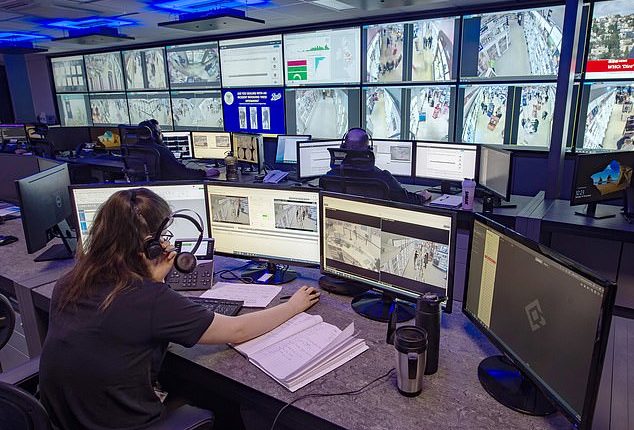
Suddenly a store assistant sounds the alarm about a potential shoplifter. Within seconds an operator watching live from behind a bank of screens at a control centre a hundred miles away issues a stern warning over a loudspeaker.
‘This is Boots CCTV,’ he booms in a strong Northern accent. This store is being monitored and recorded. Any evidence of theft will be given to police.’
The formerly unsuspecting suspect looks up at the camera, removes the items from a bag, calmly puts them back on the shelf and walks out.
Welcome to the nerve centre of Boots’ efforts to combat a shoplifting epidemic that is costing retailers almost £1 billion a year. The Mail on Sunday was given rare access to a nondescript site at Beeston, near Nottingham, which forms a small but increasingly important part of the High Street retailer’s vast head office complex.
My guide for the day, head of loss prevention Iona Blake, reels off facts and figures about Boots’ commitment to preventing theft and protecting staff from soaring levels of verbal and physical abuse.


Taking action: Nearly all of Boots’ 2,100 stores have CCTV, with 1,200 of the biggest and busiest connected to the round-the-clock monitoring centre
Nearly all of Boots’ 2,100 stores have CCTV, with 1,200 of the biggest and busiest connected to the round-the-clock monitoring centre. Each of these stores are also fitted with panic buttons that link directly to the nerve centre.
‘We get 650 alarms a day,’ Blake says.
Other retailers use CCTV but none rely on panic buttons as much as Boots. ‘I like to think we’ve got the best CCTV system,’ Blake adds.
Staff in 380 of its higher-risk outlets also wear bodycams while security guards patrol the store premises. All of these measures provide frontline workers with reassurance that they are not on their own when it comes to tackling the scourge of shoplifting.
Boots is not alone in trying to tackle a growing crime wave that retailers say increasingly involves organised gangs stealing to order.
‘Retail crime is getting worse, thieves are becoming bolder and more aggressive’ says Graham Wynn, assistant director of business regulation at the British Retail Consortium.
‘Not only do we need police to give retail crime greater prioritisation, we also need a standalone offence for assaulting or abusing a shopworker and send a clear signal that this behaviour will not be tolerated,’ he adds.
The BRC, which represents retailers, puts the scale of retail theft at £953 million, despite over £700 million of crime prevention spending by retailers in the year to April.
Increased security measures have so far failed to slow the retail crime wave. But many in the industry, including Blake, argue that without them there would be even more incidents of shoplifting and abuse of shopfloor workers.
The Co-op has seen rates of crime, shoplifting and anti-social behaviour leap 43 per cent on last year across its 2,400 stores, with almost 300,000 incidents so far in 2023 – an average of almost 1,000 every day.
Police fail to attend nearly four in every five incidents, the Co-op found, despite promises from forces and Ministers to treat shop thefts more seriously.
Like other retailers both Boots and the Co-op back The Mail on Sunday’s campaign for tougher sentences for offenders. One of the problems in tackling the offences is the fact that police forces themselves are fragmented. There are 43 of them in England and Wales, while thieves know no boundaries. Blake says ‘cross-border’ co-ordination with police forces is improving via their National Business Crime Centre and points to some successful prosecutions.
Earlier this month James Gilroy was jailed for three years after stealing perfume worth £28,000 during a two-week blitz of Boots’ stores in and around Leeds. He was finally arrested following a police car chase.
Boots’ CCTV monitoring team in Beeston bundled evidence to show that it was the same offender and worked with West Yorkshire police to build the case, including providing details of his getaway vehicle.
Describing Gilroy’s behaviour as ‘feral’ and ‘wanton’ Judge Ray Singh told him: ‘The general public is sick to the back teeth with individuals like you who think they can take items that simply don’t belong to you.’
In addition to the increased monitoring at Boots, cases of verbal and physical abuse are down by almost a quarter in stores where body- cams are worn, Blake notes.
There are other encouraging signs that the measures Boots has taken are having a positive effect.’
And it is not just about protecting members of staff.
Blake adds: ‘I don’t want customers to think our stores are not a safe place to go shopping.’









